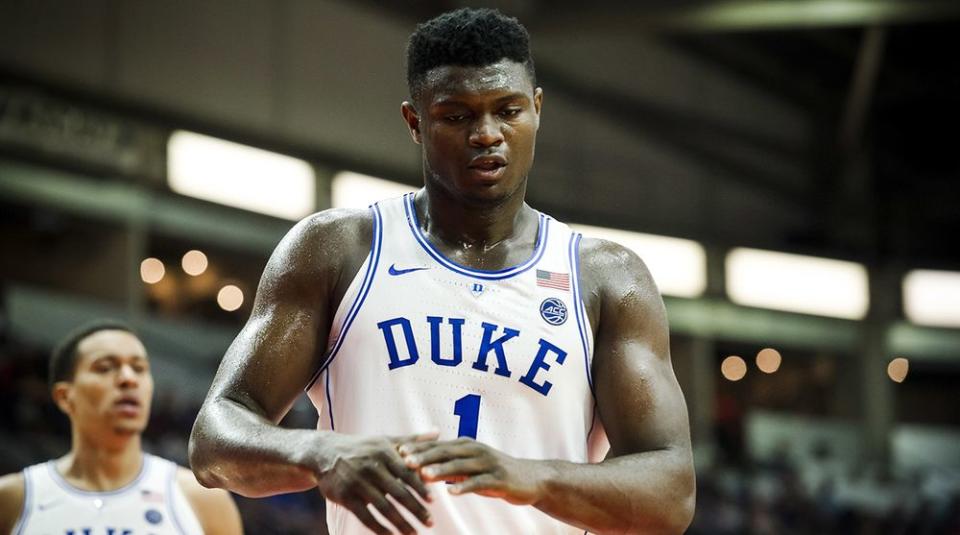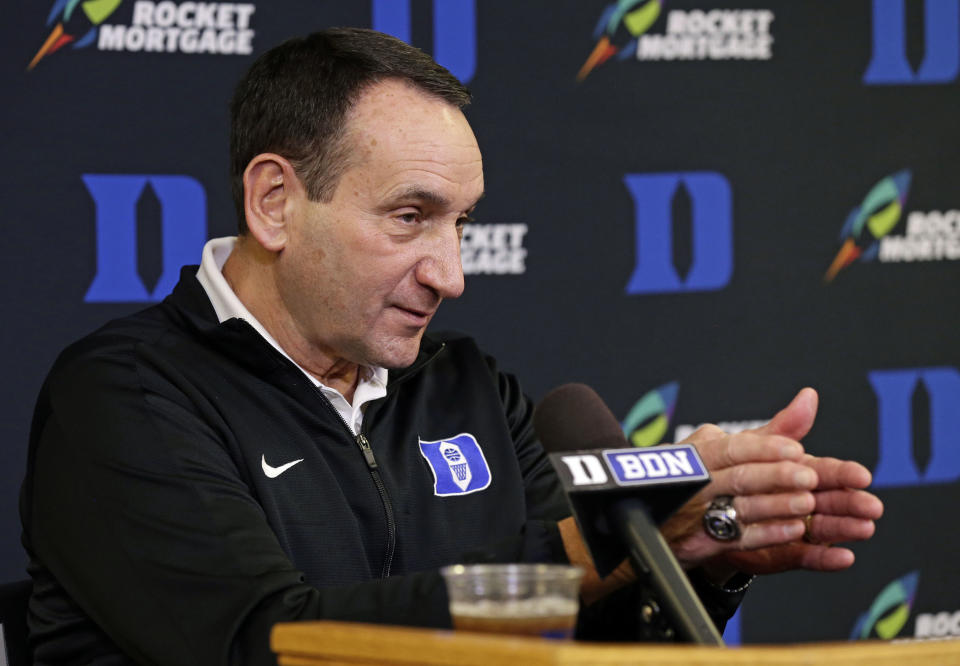Is Zion Williamson the new Cam Newton? Why Duke's star could face eligibility issues this season
The wiretap transcript read aloud in the federal basketball corruption trial on Tuesday was a bombshell. The intercepted conversation between Adidas consultant Merl Code Jr. and Kansas assistant basketball coach Kurtis Townsend centered on five-star recruit Zion Williamson. Specifically, they were discussing what it would take for Williamson to become a Jayhawk — and the asking price was high.
“[Williamson’s stepfather] is asking for opportunities from an occupational perspective, he’s asking for cash in the pocket and he’s asking for housing for him and his family,” Code said, according to the transcript.
Townsend’s response: “I’ve got to just try to work and figure out a way because if that’s what it takes to get him here for 10 months, we’re going to have to do it some way.”
And with that revelation, Zion Williamson potentially becomes college basketball’s new Cam Newton — a megastar recruit implicated in a pay-for-play scheme allegedly orchestrated by a family member. As with Newton, two schools are involved — one linked to a potential money deal, and one that actually signed the player. Also similar to Newton is the profile — Williamson has 1.7 million Instagram followers and is the Rivals.com No. 5 recruit in the country — and importance to a national championship contender.
In the wake of Newton’s eligibility case in 2010, the NCAA rules changed to close a loophole that allowed him to stay eligible, win the Heisman Trophy and national championship. Could that very rule change – the so-called “Cecil Newton Rule” – end up jeopardizing Williamson’s eligibility at Duke?
“If [Williamson’s stepfather] solicited or received money from Kansas, he would be an agent under NCAA rules and his action would affect his son’s competition eligibility at Duke,” said Nebraska law professor Josephine Potuto, a member of the NCAA Committee on Infractions for many years.

In 2010, ESPN reported that during Newton’s 2009 recruitment out of junior college, a representative of the family had sought a $180,000 payday from Mississippi State in exchange for the quarterback’s commitment. Mississippi State reported the offer to the Southeastern Conference office. It was ultimately concluded that Newton’s father, Cecil, was seeking the payment — allegedly without Cam’s knowledge or consent.
As is the case with Williamson, the school solicited for a potential deal for Newton did not sign the player. Newton wound up at Auburn, which went 14-0 with him as its centerpiece talent. The school rejected an NCAA recommendation to suspend Newton while its eligibility investigation was ongoing, and the latter portion of that season was steeped in controversy. Williamson is enrolled at Duke, not Kansas, and is expected to be a star for the Blue Devils during a short collegiate stay on his way to the NBA — if his eligibility remains intact.
Yahoo Sports spoke with six people well-versed on NCAA rules and investigations, including Potuto, this week about the Williamson situation. All six agreed that what became known as the “Cecil Newton Rule” could apply to the Williamsons.
“An agent’s activity on behalf of a prospect renders the prospect ineligible under NCAA amateurism rules,” Potuto said. “An amateurism violation affects an athlete at all NCAA schools. Amateurism violations are not dependent on where the athlete enrolls.”
Potuto cited the so-called Newton Rule, a bylaw passed by the NCAA in January 2012, in her explanation. But she included a caveat in relation to how she would view such a case if she were involved in a Committee on Infractions hearing on the matter.
“I do not know the extent to which there would need to be at least some evidence from which a reasonable inference could be drawn that the son knew or should have known of the father’s actions,” Potuto said. “It could be that the parent/child relationship by itself is enough. Certainly that would close off an easy end-around of agent rules, where the parent carefully excludes the athlete from all conversations or information, but merrily pockets the money. And the NCAA bylaw language supports this conclusion.
“On the other hand …. my own take is that there would need to be something beyond the parent/child relationship to show that the athlete had some awareness, or should have known.”
There are other issues the NCAA would have to grapple with in terms of vetting a potential ineligibility ruling for Williamson, starting with the evidentiary hearing itself. What was read in court was a snippet of one conversation, plucked from a stream of wiretapped conversations.
“This was an attorney reading a transcript, and it was presented without context,” said one source with extensive experience in NCAA investigations. “Where did the conversation begin and where did it end? In addition, this was a coach talking with a middle man, not the parent himself. It’s unclear at this point whether Zion Williamson’s dad said those things [to Code]. That’s an unknown at this point.”
The source outlined a potential defense both the Williamsons and Townsend could make to an NCAA violation allegation: “In the absence of a taped call, Zion’s family will dispute that version. Kurtis Townsend will say the conversation was taken out of context, or that he was not committing to anything, simply trying to keep the fish on the line, so to speak.”
However, another source with years of working in the NCAA compliance space said the transcript — in addition to other documents and court testimony that detailed payments to former Jayhawk enrollee Billy Preston and current player Silvio De Sousa — points directly at a major investigation headed Kansas’ way. The unknown is when and how such an investigation would unfold, since NCAA enforcement representatives have stood on the sideline while the criminal proceedings have played out. And there are still potentially two more trials remaining and perhaps even appeals after the final trial is scheduled this spring.

And what about Duke? Blue Devils athletic director Kevin White issued a statement to Yahoo Sports expressing confidence the school has thoroughly vetted the eligibility of all its players.
“All Duke student-athletes are subject to a thorough review to ensure their eligibility,” White said. “In men’s basketball, for the past several summers, Duke compliance officials, top recruits and their families have engaged in and cooperated fully with the NCAA Eligibility Center’s enhanced amateurism certification process. Duke works closely with the NCAA and the Atlantic Coast Conference on all compliance and eligibility matters. As we have stated in the past, we have an uncompromising commitment to compliance in athletics.”
The NCAA issued a statement to Yahoo Sports on Thursday that made no mention of an enhanced amateurism certification process via its eligibility center. The statement noted that “all student athletes receive an initial academic and amateurism certification. … The Eligibility Center collaborates with its member institutions as needed depending on the facts of the review.” It declined comment on Williamson directly and basically passed the issue back to Duke: “Any specific questions regarding a student-athlete’s review should be directed to the NCAA member school.”
The very fact that a current Duke player was named in the federal trial just a day after Hall of Fame coach Mike Krzyzewski declared the ongoing scandal “a blip” and “not what’s happening” in college basketball resonated around the sport. Many administrators, fellow coaches and others in the game were angered by Krzyzewski’s minimization of a federal investigation that has touched programs nationwide and tainted a sport already struggling with a shady reputation. A lot of people found Krzyzewski’s comments not merely naive, but outright disingenuous.
Some pointed back 20 years ago, to when star Duke recruit Corey Maggette played as a freshman after accepting impermissible benefits from Kansas City AAU coach Myron Piggie, who went to prison for conspiracy to commit mail and wire fraud and failure to pay income taxes. Duke was cleared by the NCAA in 2004 in the Maggette case, which cited the school’s lack of knowledge of payments the player received prior to coming to school.
“The evidence that’s coming out in trial and the issues facing schools today are a virtual repeat of what we saw in the late 1990s [with Piggie],” said Stephen Hill, who prosecuted that case and is now a partner at Denton’s in Kansas City. “Our investigation found, and we shared with [Duke] and the athletic department as well as the basketball program, they were playing a player who’d been paid to play in basketball games. His amateur status, like those athletes being discussed in this trial, was severely threatened by the fact he had received payments to play and submitted a national letter of intent.
“What we know from the evidence at trial is that there were a far broader range of actors than the charges we had in our case. That suggests you have a systemic problem.”
Duke’s place within college basketball’s systemic problem will be under scrutiny in the coming weeks, as Zion Williamson either suits up or does not. The Blue Devils’ season starts Nov. 6.
More from Yahoo Sports:
• 2003 rape allegations cost Kobe spot on film festival jury
• Controversial call wipes out Astros home run
• NFL owners take a knee in waning anthem controversy
• Dan Wetzel: Gymnastics scandal secrets may finally go public

